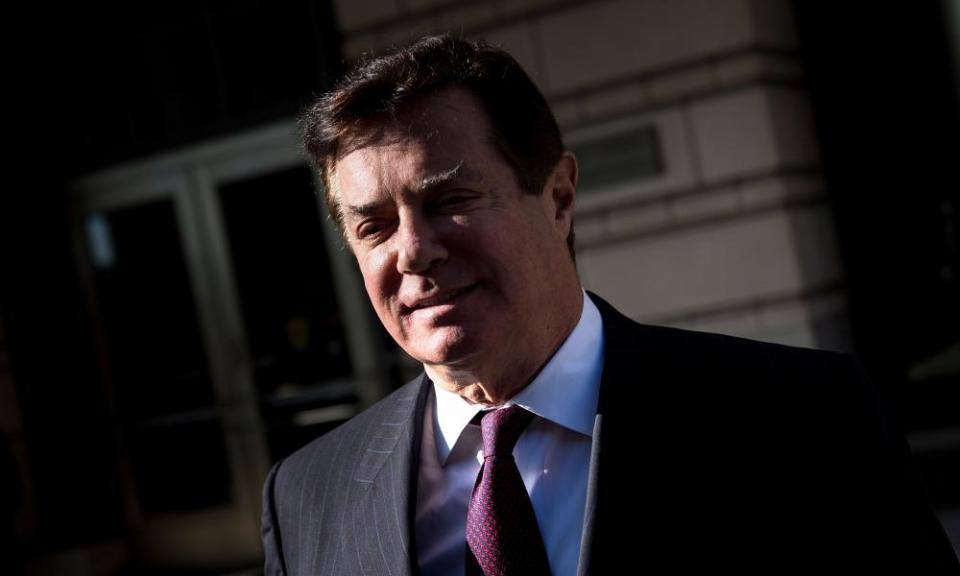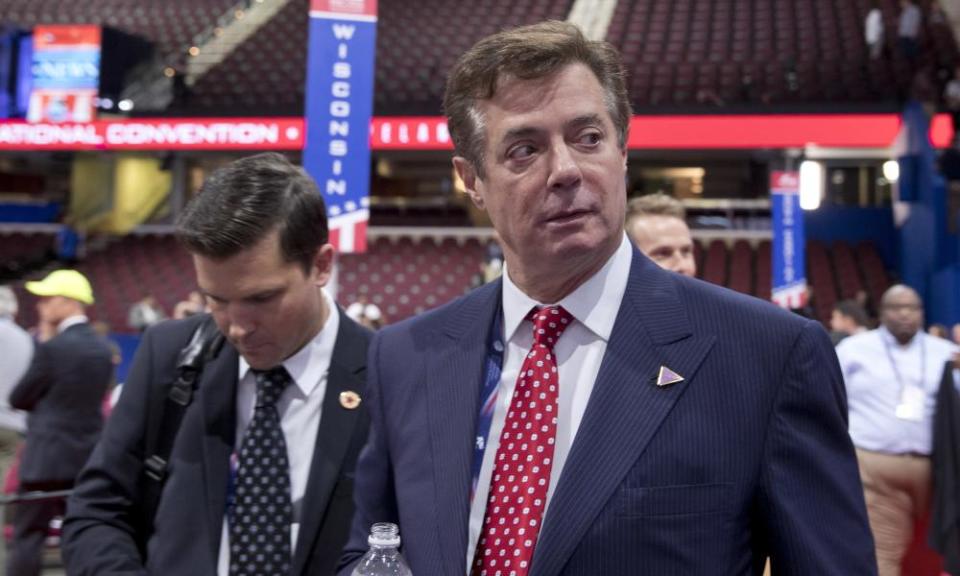The rise and fall of Paul Manafort: he sold composure but lived on the edge

For 40 years, Paul Manafort sold composure.
He sold it to politicians who wanted his advice. He sold it to party apparatchiks who feared his power. He sold it to US presidents, foreign despots, members of Congress, corporate boards, the media. As much as Alan Couture or House of Bijan, which sold him his lavish wardrobe, composure was the Manafort brand.
Manafort, 69, the former chairman of the Donald Trump presidential campaign, kept that composure on Tuesday as he listened to a Virginia jury declare him guilty of criminal fraud charges, in a verdict that meant he could die in prison.
Wearing a navy blue suit, Manafort stood stony faced as he was found guilty on the eight counts, but winked at his wife Kathleen upon leaving the courtroom.
But the verdict was a stunning reminder of how far Manafort had fallen since his heyday as one of the most powerful men in Washington.
As a young man in a hurry in the late 1970s and 1980s, Manafort, along with a few partners, reinvented the influence-peddling game in the nation’s capital, running political campaigns one moment, then taking payments from corporations to lobby the politicians he had helped to elect.
This frictionless revolving door involved the biggest names in Republican politics. Manafort helped Gerald Ford win at the 1976 Republican national convention, helped Ronald Reagan capture the White House in 1980 and helped George HW Bush hold it in 1988. He ran the Republican national convention as late as 1996.
The client list on the corporate side was equally impressive, including Bethlehem Steel, the Tobacco Institute, Johnson & Johnson and Trans World Airlines, according to the Atlantic.
The business was lucrative, delivering the partners an income of more than $450,000 each ($1m today) in 1986, they boasted. Manafort began a lifelong indulgence in multiple homes, custom suits, luxury automobiles, Concorde flights and first-class everything.
To keep the business moving, Manafort’s firm shopped its services to clients further afield with reputation enhancement needs, including Zaire’s Mobutu Sese Seko, the Philippines’ Ferdinand Marcos and Angolan rebel Jonas Savimbi.
“Don’t fool yourself,” one of his daughters would text her sister in 2014, according to hacked files. “That money we have is blood money.”
His success, and the wealth it brought, seemed to breed in Manafort a high estimation of his own ability to shape events, if not reality. He thrived as a consultant by telling politicians how they could appeal to voters, and as a lobbyist by helping his clients to understand their marks – the nation’s elected officials.
“If politics has done anything for us, it’s taught us to treat everything as a campaign,” he said in a 1989 interview.
That attitude appeared intact when Manafort arrived at district court this month in Virginia. Attendees noted how comfortable the defendant seemed. Staring down the barrel of an effective life sentence, with a federal judge and 12 jurors presiding over his fate, Manafort calmly conferred with his lawyers and occasionally turned to smile at his wife seated behind him.

He seemed to be acting the way he would advise a client in his position to act. But this time the sale fell through.
In 2005, Manafort opened an office in Kiev, Ukraine, where he would begin work for his biggest, final client. The former Ukrainian prime minister Viktor Yanukovych had lost office in January. Over the next decade, his Kremlin-backed party, the Party of Regions, would pay Manafort’s firm tens of millions of dollars for political consultancy work, federal prosecutors said.
Yanukovych may have gotten his money’s worth, winning the presidency in 2010. But the runaway kleptocracy that followed – symbolized by a stunning presidential palace outside Kiev – fueled revolutionary currents that drove Yanukovych from power, and into the arms of his protectors in Russia.
The downfall of Yanukovych coincided with a collapse of Manafort’s own. In 2015, he entered a clinic in Arizona to ward off a “massive emotional breakdown”, according to his daughters’ texts, quoted in the Atlantic. With the Kiev money gone, his once-glittering business had fallen on hard times, and he was deep in debt, according to witness testimony at his trial.
As Trump was sweeping Republican primary contests in early 2016, Manafort badly needed another score. A mutual friend put them in touch, and Manafort pitched Trump on his unique experience wrangling convention delegates.
“Paul brought a much-needed maturity to the Trump campaign when it needed an experienced political professional operative more than anything else,” former press secretary Sean Spicer would later write of Manafort’s hiring in March 2016.
“There was no semblance of a campaign structure, just a few, distraught, overworked people constantly barking into their phones. Paul immediately set up and staffed the political and communications operations necessary to take on the Clinton machine.”
In an audacious play, Manafort offered to work for Trump for free, apparently calculating that his role in a Trump victory would come with its own dividends.
There is evidence that Manafort tried to collect on such a dividend, lobbying the presidential transition team for an administration post for an executive at a bank that had loaned Manafort millions of dollars, according to emails presented at trial by prosecutors.
But if there were potential secret dividends to be had in working for Trump, there was a huge, not-so-hidden cost.
By the time Manafort’s former work in Ukraine came to public light, he was already under FBI investigation. The spotlight forced him out of the Trump campaign, closing off his longshot return to power. For the first time, Manafort’s business, and especially his discreet work overseas, was under intense scrutiny.
In April 2017, Manafort’s home was raided by FBI agents. That October, he was hit with a first wave of charges by special counsel Robert Mueller. In June this year, he was sent to jail for alleged witness tampering. Next month, he faces a separate trial on federal felony charges.

 Yahoo News
Yahoo News 